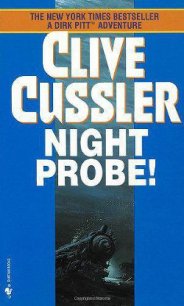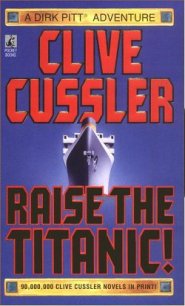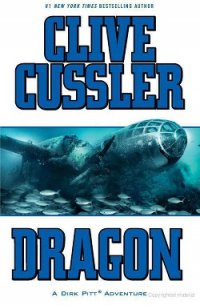Plague Ship - Cussler Clive (полные книги .TXT) 📗
“Be reasonable. We’ve checked the water system, the air intakes, the air-conditioning plant, hell, even the ice makers. If we haven’t found it yet, what are the odds we will?”
“They get better every time we check off another vector source from our list,” Mark replied. “Have you ever wondered why, when you lose something, you always find it in the last place you look?”
“Why?”
“Because you stop looking when you find it. Therefore, it is invariably in the last place you searched.”
“What’s your point?”
“We haven’t checked the proverbial last place yet.”
Even through the insulation of the dining room’s walls, they heard the distinctive beat of a helicopter’s rotor. They got up from the table and made their way aft. There was a swimming pool at the Golden Sky’s fantail. A hard cover had been placed over its aqua waters, and deckhands had cordoned off the area with rope to keep passengers well clear.
The chopper was a Bell JetRanger, with POSEIDON TOURS emblazoned on its flank. From several decks up, Mark and Linda could see the pilot and three passengers in the cabin.
“This can’t be good,” Linda said over the growing din.
“You think they’re here for us?”
“People rarely die on cruise ships, so when one of his followers was killed in Istanbul Thom Severance must have acted fast. I wonder how he got the cruise line to agree to this. Gomez Adams makes it look easy, but landing a helo on a moving ship is dangerous.”
“They’ve got deep pockets.”
The chopper flared in over the jack staff, the downwash kicking up a little spray from where crewmen had washed the deck of grit. It hung poised like a hovering insect, as the pilot judged speed and windage before lowering the craft toward the pool cover. He kept the power on, so the skids barely put any pressure on the cover, and three doors opened at the same time. The men jumped from the chopper, with nylon packs over their shoulders. The pilot needed to make a quick power adjustment to account for the sudden drop in weight. As soon as the doors were closed, the chopper lifted clean and peeled away from the ship.
“Eddie said something about Zelimir Kovac looking like Boris Karloff on a bad day.” Mark pointed with his chin.
“The big guy in the middle?”
“It’s got to be him.”
The three men were greeted by a ship’s officer but made no move to shake hands. They somehow managed to make their casual clothes—khakis, polo shirts, and light windbreakers—look like military uniforms. It was the matching backpacks, Linda thought.
“What do you think is in those bags?” she asked.
“Change of underwear, fresh socks, a razor. Oh, and guns.” Before now, they had only risked being placed in whatever passed as a brig aboard the Golden Sky and having a lot of explaining to do when they reached shore. That had changed. Kovac and his two henchmen were coming for them, and there wasn’t any doubt what would happen if they caught them.
Mark and Linda’s only advantage was, Kovac didn’t know how many people were hunting for the virus.
However, with the ship’s officers and crew acting more vigilant about possible stowaways, the two of them could be flushed out at a moment’s notice.
“Something just occurred to me,” Mark said as they turned away from the rail.
“Yeah, what’s that?”
“Would Kovac risk being aboard this ship if they are going to hit it with the virus they used to kill everyone on the Golden Dawn?”
“He would if he’d been vaccinated.”
By noon, three-quarters of the people on the ship were suffering coldlike symptoms, and, despite precautions, Mark and Linda were included in that group.
CHAPTER 32
THE HIGH DESERT WIND SHRIEKED ACROSS THE AIRFIELD, throwing up towering clouds of dust that threatened to block out the sky. The pilot of the chartered Citation jet came in on the runway fully thirty feet to the left, to account for the cross-wind hammering the fuselage.
The gear came down with a mechanical whine and thump, and flaps were extended. The turbojets roared to keep the aircraft aloft for a few more seconds.
The sole passenger seated in the cabin paid no attention to the weather conditions or the dangerous landing. Since catching a commercial flight from Nice to London, and then on to Dallas, where the leased executive jet was waiting, he sat with his laptop open and his fingers dancing across the keys.
When Eric had come up with his plan to fire the Russian ballistic projectile weapon, it had been the barest outline of an idea. He hadn’t considered the tremendous amount of data he needed to make it work. Orbital speeds, vectors, the rotation of the earth, the mass of the tungsten rods, and a hundred other elements—all had to be factored into his computations.
With his naval background, he was more than confident he could do the mathematics, although he would have liked Murph’s help. Mark had an innate grasp of trigonometry and calculus that would have made this so much easier. But, then, he would have insisted on taking command, and the Chairman would have rightly given him the slot. Mark was simply more qualified to do this than Eric.
Because this broke down to a communications exercise between the satellite and the computer, Hali Kasim would have been the next logical choice. The only problem was that Hali got sick on carnival rides and wouldn’t have been able to do the work.
Eric got tapped to do what only a handful of people had ever done. He would allow himself to get excited about it later, but, for now, he had to work the numbers. He had told Jannike Dahl about needing to do this, embellishing the danger, while not spelling out the reason. And with Mark trapped on the Golden Sky, he had stepped up his pursuit of the beautiful young Norwegian. He was already up to the eighth item on his courtship checklist and almost pushed it to number nine by trying to hold her hand when he explained why he had to leave the ship. He wished he knew what it meant when she had cocked her head and parted her lips just before he left her in the infirmary.
He should have asked Dr. Huxley.
The plane touched down, swaying dangerously on two wheels for a moment before the pilot could kick in the rudder to even her out again. They taxied a long way—the airstrip was over three miles long—and finally came to a massive hangar next to another unmarked executive jet. Above the hangar door was the name of a long-defunct airline. The engines spooled to silence, and the copilot emerged from the cockpit.
“Sorry, Mr. Stone, but we can’t taxi into the hangar in this sandstorm. But, don’t worry. It’s going to die down by tonight.”
Eric had already checked a dozen weather sites on the Internet and knew to the minute when this cold front would move on. By midnight, there wouldn’t even be a breeze.
He closed up his laptop and grabbed his suitcase, an old Navy duffel that had followed him from Annapolis.
The copilot opened the door and Eric fought his way down the stairs, slitting his eyes against the sand blowing across the tarmac. There was a man near a small door set into the larger hangar door waving him over. Eric jogged the forty feet to the door and ducked through. The stranger immediately closed it.
There was a large aircraft in the center of the hangar covered in canvas tarps. Its shape was hard to make out, but it was unlike anything else in the world.
“Damned dust plays havoc on the planes,” the man griped. “You must be Eric Stone. I’m Jack Taggart.”
“It’s an honor to meet you, Colonel.” Eric said with a touch of hero-worship. “I read about you when I was a kid.”
Taggart was in his sixties, with a leathery weather-beaten face and clear blue eyes. He was ruggedly handsome, like an idealized figure of a cowboy, with a firm jaw and a day’s worth of silver stubble. He wore chinos, a flight uniform shirt, and a bomber jacket despite the heat. His handshake was like iron, and his baseball cap had the logo for one of the early Space Shuttle missions. He had been its pilot.




